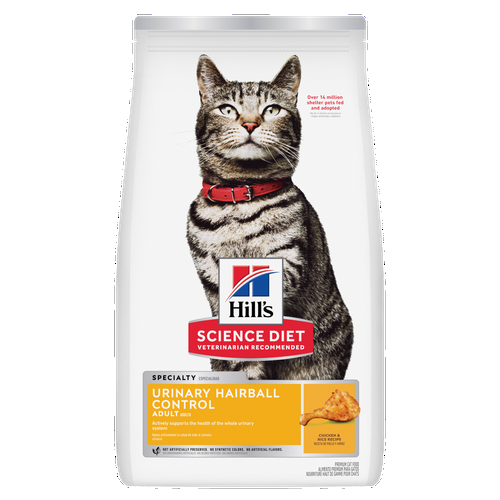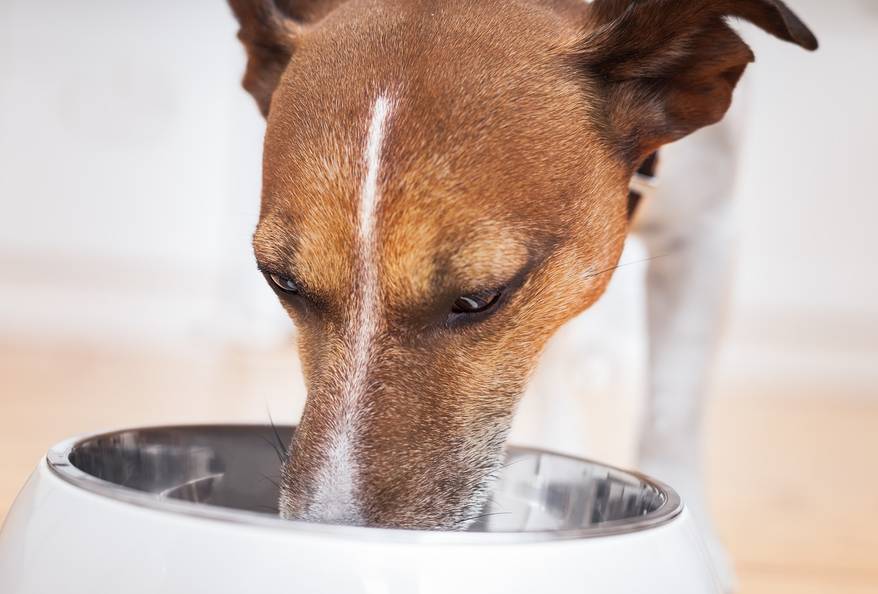
-
Find the right food for your petTake this quiz to see which food may be the best for your furry friend.Find the right food for your petTake this quiz to see which food may be the best for your furry friend.Featured products
 Hill's Science Diet Adult Oral Care Chicken, Brown Rice & Barley Recipe Dog Food
Hill's Science Diet Adult Oral Care Chicken, Brown Rice & Barley Recipe Dog FoodClinically proven kibble technology to reduce plaque & tartar build-up
Shop Now Adult Small & Mini Lamb Meal & Brown Rice Recipe Dog Food
Adult Small & Mini Lamb Meal & Brown Rice Recipe Dog FoodFor the faster metabolism of Small & Mini dogs
Shop Now Adult 7+ Small & Mini Chicken & Brown Rice Recipe Dog Food
Adult 7+ Small & Mini Chicken & Brown Rice Recipe Dog FoodFor the unique nutritional needs of mature Small & Mini dogs
Shop NowFeatured products Adult Indoor Chicken Recipe Cat Food
Adult Indoor Chicken Recipe Cat FoodSupports energy level and beautiful fur in indoor cats
Shop Now Hill's Science Diet Adult Sensitive Stomach & Skin Dog Food
Hill's Science Diet Adult Sensitive Stomach & Skin Dog FoodHighly digestible recipe, gentle on stomachs. Nourishes skin & promotes a lustrous coat
Shop Now Adult Urinary Hairball Control Chicken & Rice Recipe Cat Food
Adult Urinary Hairball Control Chicken & Rice Recipe Cat FoodActively supports the health of the whole urinary system
Shop Now -
Featured articles
 My Pet Ate a Lizard — What Should I Do?
My Pet Ate a Lizard — What Should I Do?Learn what to do if your pet eats a lizard, including whether they can be toxic and symptoms to keep an eye on when they've swallowed one.
Read More Easy DIY Dog & Cat Toys: Nine of Our Favorites
Easy DIY Dog & Cat Toys: Nine of Our FavoritesBrowse this comprehensive guide for several of our favorite DIY dog and cat toys that are sure to put a little pep in your pet's step.
Read More 15 Pet-Friendly Cities Ideal for a US Road Trip
15 Pet-Friendly Cities Ideal for a US Road TripCheck out our list of pet-friendly U.S. cities that are excellent travel options, offering off-leash dog parks and pet-friendly restaurants & hotels.
Read More -


There are a million reasons why being a pet owner is fun and enjoyable, but dealing with dog digestive problems is not one of them. It doesn't matter how old or well-behaved your dog is, you have probably heard gagging sounds from another room or seen your pup in distress in the backyard at least once. When it comes to cleaning it all up, dog parents know all too well about rubber gloves and air freshener. Dealing with a dog's upset stomach is necessary, so here are some ways to cope and reduce the incidence and severity of your dog's tummy woes.
Coping Calmly
Your dog will likely experience a digestive issue at some point in his life, and at the moment, it is most important to make sure your dog is okay before you worry about vomit on the sofa or poop on the carpet. If you notice blood or your dog is trembling or unable to move properly, you should seek medical treatment immediately. However, if your dog just seems to have some diarrhea or refuses to eat, you can usually wait things out for twenty-four hours to see if the condition improves. The American Kennel Club (AKC) recommends having your dog fast for twelve to twenty-four hours, as long as he is not elderly, still a puppy, or a very small breed with low stamina. Always make sure he has plenty of fresh water to drink, and check with your vet if he appears weak or lethargic. Once things have settled, the AKC suggests slowly feeding your pooch bland food such as plain white rice and boiled chicken. If it was just a simple upset, your dog should be back to normal within a day or two. It never hurts to contact your vet and get their opinion over the phone on whether you should bring your dog in or not just to be on the safe side.
As you wait things out (and have messes to clean up) try to use natural cleaners — PetCoach offers some suggestions — and keep your dog contained in one area of your home, close to an outside door. Also, try to think about any changes you made in the home or anything your dog may have gotten into that could be making him sick. The Pet Poison Helpline provides a list of common household items that are toxic to dogs, from foods like chocolate to unexpected risks like dropped allergy pills. As soon as you notice digestive problems, take note of changes and frequency of vomiting or diarrhea. When you do have to notify the vet, your observations can help them diagnosis whether this is just a temporary issue or a sign of a more serious condition.
While you are dealing with dog stomach problems, remember to stay calm and don't yell or discipline your dog when he makes messes in the house. Causing your dog to become more stressed or anxious will not help him get better. Here are some helpful tips on managing your dog's digestive issues to save you some headache:
- Take him on walks or let him outside more frequently than normal. It's better to have him "make his mess" outdoors rather than indoors.
- Keep him in a room or area of the house that is easier to clean up. While your dog might get the run of the house normally while you're away, keeping him in a room devoid of carpet and rugs will make cleaning up any messes easier to deal with. Typically, rooms like the bathroom, kitchen or laundry room are good places for them to stay when you're not home as floors are often tile, linoleum or wood.
- Doggy diapers: while maybe not the most fashion forward dog outfit, doggy diapers can be helpful at preventing messes that would otherwise occur on the ground.


Tasty Tips
Proper Nutrition Is Top Priority
Some stomach issues may be prevented if your dog is being fed the proper food in the proper amounts. If you do decide to change what you feed your dog, you should transition slowly and overlap the new and old food to reduce the risk of dog digestive problems. It is also important to talk with your vet about all dietary changes and supplements you give your dog. Most dogs do not need vitamins or supplements, says the American Veterinary Medical Association (AVMA). All of their nutrition can and should come from a balanced dog food. The AVMA also emphasizes that supplements have potential ill effects. Adverse effects of glucosamine, for example, can include gastrointestinal upset and problems with regulating blood sugar. Your vet is truly the only person who knows if your dog needs a supplement, so don't rely on catchy ads or a friend's recommendation about giving him any vitamins.
The same goes for any home remedies you may have heard for doggy diarrhea or nausea, from giving human antidiarrheals to slippery elm or probiotic capsules. Talk to your vet before trying anything besides food and water.
Anyone who has ever had a dog knows that digestive problems can always be an issue, so understand you're not alone. Although dealing with dog digestive issues can be frustrating, try to stay calm and work with your vet to find a solution that reduces or eliminates future gastrointestinal problems. The healthier your pup is, the more time you can spend doing fun things together.


Chrissie Klinger is an educator, writer and mother of two children, three dogs and three cats. Her dog Jake loves sitting on her lap every chance he gets! She enjoys living an active and eco-friendly lifestyle in rural Pennsylvania.
Related products

Clinically proven kibble technology to reduce plaque & tartar build-up

Improves everyday ability to get up & go

For the unique nutritional needs of mature Small & Mini dogs

For the faster metabolism of Small & Mini dogs
Related articles

Your dog's coat and skin are a big part of your dog's overall health. Ensure you keep your dog's coat healthy, by following these simple tips.

Learn basic steps & precautions for treating a cut on your dog, including what you can put on the cut, and when you should take them to the vet.

Discover how the field of dog science is giving us more and more insights into the inner workings of our furry best friends.

Understand the role that Omega-6 and Omega-3 fatty acids play in your dog's overall health, and how you can ensure they are getting enough.

Put your dog on a diet without them knowing
Our low calorie formula helps you control your dog's weight. It's packed with high-quality protein for building lean muscles, and made with purposeful ingredients for a flavorful, nutritious meal. Clinically proven antioxidants, Vitamin C+E, help promote a healthy immune system.
Put your dog on a diet without them knowing
Our low calorie formula helps you control your dog's weight. It's packed with high-quality protein for building lean muscles, and made with purposeful ingredients for a flavorful, nutritious meal. Clinically proven antioxidants, Vitamin C+E, help promote a healthy immune system.


